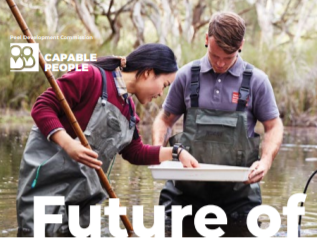You might have heard that the world of work is changing — new technologies, the gig economy, increasing automation, and jobs that you’ll be applying for that don’t exist yet.
The World Economic Forum estimates that half of all work tasks will be handled by machines by 2025 but millions of new jobs will emerge in care, big data and the green economy. Future economic growth in the Peel region will reflect this trend with new jobs most likely to be in areas such as health and aged care; water science; agriculture, especially advanced agriculture and agtech; and mining and advanced manufacturing.
Many of our existing jobs, as well as most of these new jobs, will rely on STEM (Science, Technology, Engineering and Maths) skills as well as demanding ‘human’ skills such as communicating, interacting, decisionmaking, reasoning and advising.
Employers will be looking for multiskilled workers. In agriculture, for example, jobs will continue to call for basic manual and mechanical skills as well as increasing demand for higher-level skills such as your ability to use and maintain technology; how you analyse and visualise data and make decisions based on your data, and your capacity to continue learning and renewing skills.
Jobs in health-based areas that seek to improve the mental or physical health of others will grow strongly over the next few years.
This is not just nurses and doctors but fitness instructors, occupational therapists, massage therapists, paramedics, medical technicians, and so on. All these jobs will have access to new technologies and will need STEM skills as well as skills in interacting with others, and problem-solving and organisational skills to make effective use of new equipment and software.
Education will be key to how you meet the demands of jobs of the future. For some that will mean a degree or VET qualification, for others, it will mean a short course (or what some people are now calling a micro-credential) to upgrade their skills or to gain new competencies.
No matter where you start, to be successful it will be advantageous to have solid grounding across several areas of knowledge and skill. Good depth of knowledge in different disciplines helps support creativity, problem-solving and innovation. Think of a radiologist with some background in gaming or 3-D visualisation who might come up with an innovative way of helping patients visualise their scans or a farmer with data skills who can use remote monitoring to better utilise scarce water resources.
Where do you start?
Murdoch University (www.murdoch.edu.au/ study) and South Metropolitan TAFE (www.southmetrotafe.wa.edu.au) offer a wide range of courses that will help you gain future-ready qualifications that prepare you for a wide range of careers in demand across the Peel region. One obvious example is the certificate courses and micro-credentials SM TAFE offer in automation, including Australia’s first Certificate IV in remote operations. Murdoch has courses to set you on a path to a career in agriculture, health, nursing and aged care, or one of many STEM-based professions.
Work might be changing, but that doesn’t have to mean that robots will take your job. The key to your future is being adaptable and how you manage being adaptable will help you carve out a good career.
For more information visit Peel Development Commission, Murdoch University and South Metropolitan TAFE
This article was first published in the Peel Magazine, Spring/Summer 2020 – vol 6.1 – to read and download the full magazine click here



